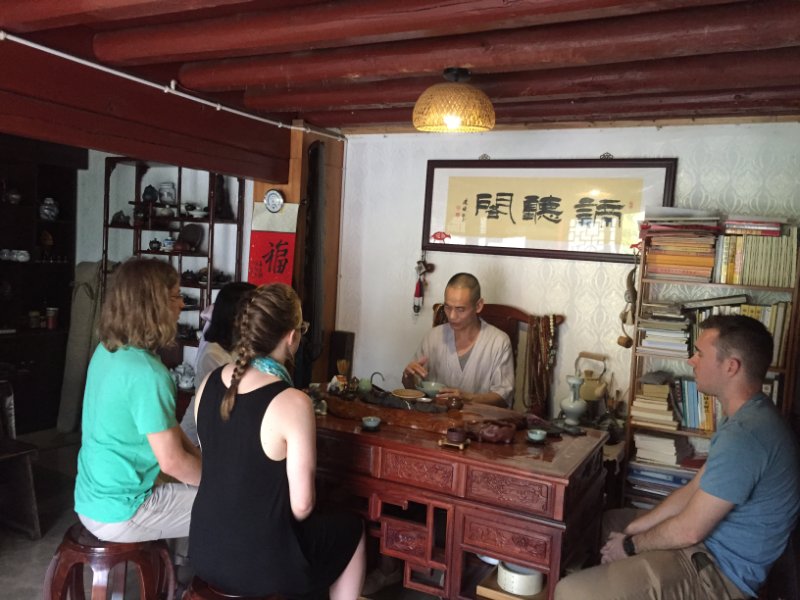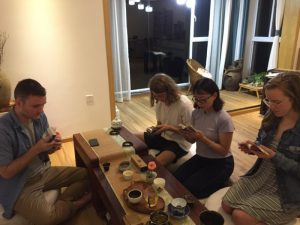Reflections of Studying in China

- Tell us about the university, academic experience, the classes, student life, and clubs or activities you are involved with? How are the locals, are there any differences or similarities that have surprised you based on your expectations?
With CET Kunming, the academic life was very structured and that’s one of the factors I considered when choosing a program. I wanted to devote myself almost entirely to the study of the Chinese language, so I chose a program that wasn’t a normal study abroad/travel experience or internship, but an intensive language program in which the academics were very focused. To give the reader a little insight into what the academic life was like in an intensive language program, most weeks (8 total), except for those when we had a special language-related event planned and skipped a day of classes or a test, our schedule was as follows:
Monday-Thursday
Roughly four hours of classes; two hours of large classes taught by the head instructors (two of them in third year) to cover the grammar and vocabulary of the day’s lesson, then about 50-minute-long “drill-class” to practice the same grammar and vocab, and then another 45 minutes or so for discussion class based on discussion questions which we prepared answers for as part of the daily homework. The drill and discussion classes would be taught by “small-class teachers” who were graduate students being taught how to teach Chinese. Despite their being graduate students all of the third-year teachers were fantastic, some of the best I’ve ever had, and the academic aspect of the program was much stronger than I anticipated actually. In third year there were five of these graduate student-teachers, so for the drill-class and discussion class we would always be rotating between them and the classmates we learned with in each class would change daily as well. We had seven teachers total and about 14 students, so in the large classes there would be 7 each, and 3-4 in the small classes, so the students had no problem participating and receiving attention from the teacher. Sometimes the academic director would come in during class to give the student-teachers criticisms or help them adjust their teaching method/style. It was all very focused and serious and ran like a well-oiled machine. After those four hours of classes we went to have lunch, where most students went with the teachers to the cafeteria and got to chat with them will eating, both to practice Chinese and get to know each other more on a personal level. After lunch each student had a one-on-one class with one of the student-teachers to discuss the day’s lesson (or if you were lucky a topic of your choosing). I think this was many students favorite class because of the personal feel to it, and the opportunity it gave them to practice conversation skills and get direct feedback on some of the problems they had. As for me, since the teachers thought my skill-level was a bit higher than the material we were studying, I often talked with the teacher about whatever we felt like discussing, from topics like Zen Buddhism to Chinese literature and history, my own thoughts on American culture or my life experiences and philosophy in general.
Fridays
On most Fridays we had both a written exam from around 8:30 to 10:30 and then each student had an individual oral exam with the teacher for 15 minutes or so. Some weeks we had special events planned, such as a debate, or an interview with a local blogger where the students posed questions for him that they had come up with that week.
Because it was an intensive language program, and we took a language pledge to only speak Chinese for the entire duration of the program (although of course some students broke it), saying that we spent 5 hours studying in classes every day is still an understatement. On top of this we had homework and preparation that was required for the next day. Most students took between 2-3 hours each day to complete this, which makes sense given that we covered an entire lesson in one day. In other words, what is completed at Western in a week or more is covered each day at CET Kunming. And the kicker is that if you respect the language pledge, as most did most of the time, even when you aren’t studying you are still studying. I spent at least an hour each day, sometimes up to three hours talking with my local Chinese friend and because of this my spoken Chinese improved astronomically. So, to sum it up, studying in this kind of program was even more than a full-time job, it was our lives for those 8 weeks. Despite all the effort that it took, the results and experience of it all was more than worth it.
- Have you identified strategies or aspects of your program or host culture that provide a better access and insight into community engagement? Do you have advice for others interested in studying abroad?
I think the most important thing for students studying abroad is to find one really good local friend. This kind of happened by chance for me, but I think in most programs it should be feasible to make it happen actively. For example, in my program each student had a Chinese roommate, who were all very enthusiastic to get to know, become friends with, and help us. Although I didn’t end up getting along with my own roommate, I became very good friends with my classmate’s roommate and we still talk all the time on WeChat and plan to get together to travel after we graduate. But the way to gain access and insight into the community is, of course, through the locals, and if you make one good friend while in your host country it can make all the difference. The friend I made was not only helpful for friendship and emotional support, but for my academic life and my learning about the local culture as well. She ended up helping me with my studies whenever I needed it, and when I didn’t we would just sit around the coffee shop she worked at and talk for hours at a time while I went over the next day’s lesson, or we would drink tea and talk about Chinese literature, Daoism, Jazz, Game of Thrones, or anything that popped into our minds. In this way I got to learn about certain things from her point of view and in many ways she became my window into Chinese culture, which was especially difficult to talk about when one can only communicate in their second language.
(her mom made us pose for the picture and pretend to read Chinese poetry books)
When we had time on the weekends, her and I and one other friend took trips to other towns in Yunnan province and we would visit local temples, tea shops, pottery shops, old Qing dynasty style houses and the like, and she would be the one to relate to us the history and cultural significance of it all. We even made one trip to her home town, where her mom invited us to stay with them in their home for a couple of nights. We visited her mom’s tea shop in town, went down to the countryside to where she grows fruits and vegetables and got a huge spread of home-made food cooked for us by some of her family members, visited a Zen temple where her mom served us tea and we chatted about Tao Yuanming, Buddhism, Tea culture, and life.
Later we went to another Zen temple whose abbot gave us a tour and spent at least an hour serving us tea in the style of both the Tang and Song dynasties (not something many people know how to do) and explained to us much information about things he had learned over many years of reading books written in classical Chinese and obtaining learning that has been lost to most people. It was all very surreal, almost like we didn’t belong in those scenarios but it was so great that we were in them.
Later we returned to their home and got to meet my friend’s grandparents and hear some of their life history and get a rough translation from one dialect of Chinese to the one we could speak and understand. These are just some examples, and the entirety is too much to put into writing, but these unforgettable experiences were all completely dependent on my meeting and become friends with just one person. As for China, in general the locals are very enthusiastic about sharing their culture with foreigners, but I’m sure these kinds of people can be found everywhere. I think it is the study-abroad student’s duty and privilege to find that one person or persons who can make this kind of experience happen and act as their window into the local culture. From my experience, the quality of my study-abroad trip centered on this single thing.
Pic 1.(talking and drinking tea with my friend’s mom and a classmate)
Pic 3.(my classmate, teacher and I from left to right)
SCHOLARSHIPS:
As a side note, if anyone is looking for *need-based financial aid/study-abroad scholarships and going to Asia they should look into the Freeman-Asia scholarship, which was most of my financial support for my experience. While I got a small sum from my program, CET, about half of my expenses were funded by Freeman-Asia which is an organization that gives out scholarships for students studying abroad in Asia, especially for those studying so-called critical languages like Chinese. The application wasn’t too intensive either, so if you are interested go check it out! URL below…






